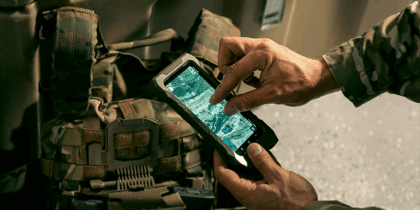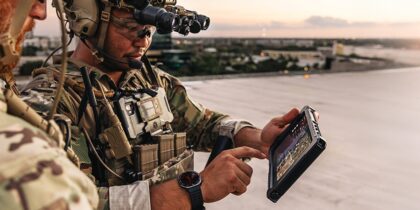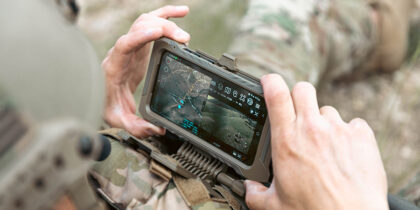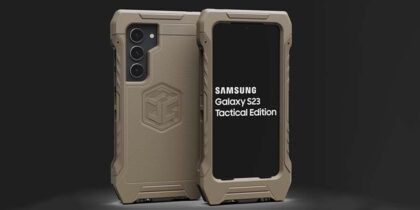Movies featuring service members shouting into walkie-talkies or tactical radios while bullets fly overhead are part of popular culture, but as we know, voice is only part of military communications. Ground troops carrying mobile smartphones are, in fact, the center of a digital ecosystem, able to capture, analyze and share crucial real-time data for better situational awareness while controlling digital assets on the battlefield. All this capability is driven by two key factors: connectivity and security.
In high-stress situations, users need to make use of all the apps at their disposal, from voice communications to ATAK, BATDOKTM, unmanned vehicle control suites and more. Not that long ago, troops in the field would connect their Galaxy smartphones to tactical radios through a USB cable. Now, Samsung’s Galaxy S20 Tactical Edition is designed to augment communications alongside those radios wirelessly over 5G NR or 4G LTE networks — via a commercial network or one of Oceus’ portable solutions designed for missions where cellular service is unavailable or unreliable.
Beyond connectivity, using a phone as a hub for data, voice, edge computing and control requires stringent security. DISA and NSA requirements, including Commercial Solutions for Classified (CSfC) compliance, exist to ensure that devices comply with the most rigorous standards, which the Galaxy S20 Tactical Edition was designed to meet. However, this demand for data and device integrity can make it difficult to integrate functions and features onto certain devices. Oceus, as a CSfC-Trusted Integrator, develops solutions to meet those standards; we can extend the phone’s capabilities while improving security further.
Maintain cognitive dominance across all domains
Get your free guide to mission-ready mobile solutions built for the hyper-enabled operator. Download Now
Samsung Knox provides Galaxy S20 Tactical Edition phones with defense-grade device security. Oceus’ Secure Mobile Platform (SMP) enhances Knox with intuitive security and device management that other Android platforms simply can’t use. A prime example is the National Security Agency (NSA)’s Mobile Access Capability Package (MACP), which sets a high bar for virtual private network (VPN) access. To transmit or receive top secret information, all data must go through what is essentially a VPN tunnel within another VPN tunnel. This function is not enabled by default in the Android OS; a developer would need to root the phone to enable it. Oceus’ VPN Manager — part of our SMP — leverages Knox and allows Oceus Networks to exceed this requirement on a standard, out-of-the-box Galaxy S20 Tactical Edition phone.
But VPN requirements may change based on where the user is located and what data they are accessing. VPN Manager can also detect when you go from one area to the next and change the configuration automatically, so the soldier doesn’t have to look at or touch the screen to remain connected.
VPNs can keep data safe, but the phones themselves can still present a risk. Even removing the SIM card won’t make the phone “invisible”; by law, commercial phones must allow a user to call 911 and transmit location data even if they aren’t connected to the network. Using SMP, Galaxy S20 Tactical Edition phones can be set to run in “Stealth Mode” with a single button push, meaning zero cellular, Wi-Fi, 911 or Bluetooth connectivity. In a hostile environment, this radio silence can prevent detection by an adversary.
While “Stealth Mode” is crucial during certain phases of a mission, most often, phones will need to be live and connected. Since, by design, phones constantly seek out every possible connection to find the strongest link, an adversary could attack the phone utilizing man-in-the-middle attacks that force the phone to an older, less secure cellular technology.
To prevent this, SMP uses the “band selection and locking” function of the Galaxy S20 Tactical Edition — the only current-generation phone with this feature. On a mission-by-mission basis, SMP can lock the phone to 5G or 4G only while monitoring the health of the phone and the network. If a compromise is detected, SMP alerts both the user and management systems and can even shut down all radio frequency (RF) communication limiting the risk to the operator and the mission.
The Department of Defense (DoD) has shown a preference for commercial off-the-shelf solutions (COTS) products, as it allows service members to have ready access to the latest technologies. But not every phone can support the specific needs of frontline operators. Instead of working around the limitations of most devices, Oceus augments the unique advantages of the Galaxy S20 Tactical Edition — a smartphone designed for and proven by operators, and the ideal platform for solutions that make it even more configurable to meet changing mission requirements.
Discover how the Galaxy S20 Tactical Edition delivers persistent, secure communications and control for every mission.








